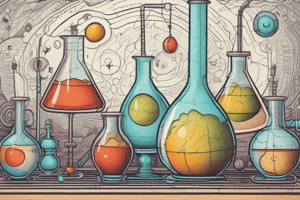Podcast
Questions and Answers
What is the primary purpose of conducting an experiment?
What is the primary purpose of conducting an experiment?
- To test a hypothesis (correct)
- To prove a statement is false
- To gather random data
- To validate historical events
A conclusion that disproves the hypothesis is considered true.
A conclusion that disproves the hypothesis is considered true.
False (B)
What is the final answer to a problem in the scientific method called?
What is the final answer to a problem in the scientific method called?
Conclusion
When the conclusion supports the hypothesis, it is regarded as ___.
When the conclusion supports the hypothesis, it is regarded as ___.
Match the following terms with their definitions:
Match the following terms with their definitions:
Which of the following best describes the scientific method?
Which of the following best describes the scientific method?
Hypotheses must always be proven true in order for a scientific investigation to be successful.
Hypotheses must always be proven true in order for a scientific investigation to be successful.
What is the purpose of making observations in scientific research?
What is the purpose of making observations in scientific research?
The steps in the scientific method typically include observation, hypothesis, experimentation, and ________.
The steps in the scientific method typically include observation, hypothesis, experimentation, and ________.
Match the following terms with their definitions:
Match the following terms with their definitions:
What does the term 'science' originate from?
What does the term 'science' originate from?
The scientific method is a linear process that always follows the same steps in order.
The scientific method is a linear process that always follows the same steps in order.
What is the purpose of defining a problem in the scientific method?
What is the purpose of defining a problem in the scientific method?
A hypothesis is an _____ guess about a problem.
A hypothesis is an _____ guess about a problem.
Match the steps of the scientific method with their definitions:
Match the steps of the scientific method with their definitions:
Which of the following best describes the scientific method?
Which of the following best describes the scientific method?
The goal of the scientific method is to discover knowledge.
The goal of the scientific method is to discover knowledge.
Name one factor involved in the process of observation.
Name one factor involved in the process of observation.
Flashcards are hidden until you start studying
Study Notes
Definition of Science
- Originates from the Latin term "scientia," meaning knowledge.
- Constitutes a systematized body of knowledge derived from facts and observations.
Understanding the Scientific Method
- A structured approach to verify facts, investigate phenomena, and discover new knowledge.
Steps of the Scientific Method
-
Observation:
- Involves noticing something through sensory experiences that prompt questions.
- Serves as the initial step to gather knowledge about the external world.
-
Define a Problem:
- Entails formulating questions based on observations.
- Focuses on what factors are involved, how processes work, and why phenomena occur.
-
Propose a Hypothesis:
- A hypothesis is an educated guess or a tentative answer to the proposed problem.
-
Experimentation:
- Testing the hypothesis under controlled conditions.
- Aims to validate the hypothesis or assess the efficacy of untested elements.
-
Drawing Conclusions:
- Outcomes from the research are analyzed to derive a final answer, known as the theory.
- Conclusions will either support or disprove the original hypothesis.
Evaluation of Conclusions
- If the conclusion supports the hypothesis, it is considered true.
- If the conclusion disproves the hypothesis, it is deemed false.
Studying That Suits You
Use AI to generate personalized quizzes and flashcards to suit your learning preferences.




